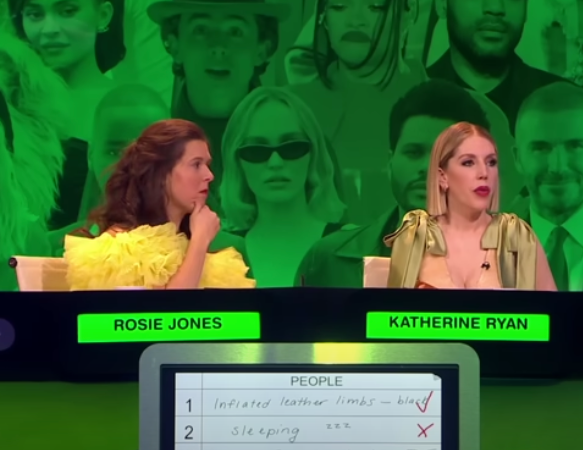We should count ourselves lucky to have Rosie Jones on our screens
When the comedian, who has cerebral palsy, sparked unfavourable comments for her appearance on Channel 4’s ‘Big Fat Quiz of the Year’, it was just the latest pile-on she has had to contend with. Criticise her material, if you must, says Cathy Reay – but understand that insults about a disabled comic’s talent are so often intertwined with those about their impairments


Whenever I see a fellow disabled person succeeding in something, my hope that ableism is being stamped out seems to be shattered as quickly as it was built.
When Rosie Jones received a fresh torrent of abuse earlier this week, it felt like we are ending this year exactly where we started it – with good old ableism rearing its ugly head to remind disabled people that we just aren’t welcome here.
The comedian, who has cerebral palsy and has had to navigate an increasing amount of ableist hate speech in parallel to her career ascension, was slammed after appearing on Channel 4’s Big Fat Quiz of the Year earlier this week. Despite Jones being surrounded by comedic peers on the programme, including Katherine Ryan, Richard Ayoade and host Jimmy Carr, viewers took the opportunity to single her out, lambasting her talent – and her disability – on X (formerly Twitter).
“The only time she is funny is when she dribbles down herself. She ruins every show she is wheeled out on. Just a tick box exercise,” said @StayDark666.
@Rommytips said: “She is s*** at her job, and her disability is a part of it. In the same way I wouldn’t want my taxi driver to be blind. Life is cruel, but c’est la vie.”
“Comedy isn’t content, it’s simple mechanics, timing, tension and delivery…. Rosie Jones thru no fault of her own cannot achieve the simple mechanics of delivery. That’s it,” added @keithTalent8
Jones received a number of supportive messages, too, but which comments would you most likely remember? Referencing the comments she received after appearing on The Royal Variety Show last December, Jones tweeted last night: “Rinse and repeat. Different telly show, same old ableism.
“Thanks for the support, but I’m gonna lie low for a bit and sink into the perineum of Christmas and New Year.”
Whenever a disabled person appears on telly, in a show that predominantly features non-disabled people, people rush to vilify their talent, and ultimately their right to exist on a mainstream programme. Insults about their skills are so often intertwined with insults about their impairments in order to denounce their right to perform and work in non-disabled contexts.
Rose Ayling-Ellis and Ellie Simmonds were piled on when they competed in Strictly Come Dancing in 2021 and 2022 respectively. This year, haters came out in their droves again when a rumour surfaced that there would be a wheelchair-using contestant – in the end, there wasn’t one. Did ableism or fear of it win out?
There are so many barriers in place that make it impossible for disabled people to even be in the same room as non-disabled people in entertainment. To get as far as Ellie and Rose did was a massive breakthrough, but most people aren’t as lucky.
Just earlier this month, a University Challenge episode was pulled because the accessibility requirements of two contestants, one of whom was neurodivergent and the other Blind, weren’t met during recording. Blind contestant Robin Millar wrote on X/Twitter: “Truly awful day recording Xmas University challenge. BBC still in Dark Ages re supporting disabled people. depressing and more demeaning than any experience for many, many years.”
Of course, as Jones has also said herself, people are free to find her – or any other disabled comedian – unfunny. Disabled people are even allowed to think Jones isn’t funny – I know… wild! Nobody should feel forced to enjoy someone’s work just because they’re a marginalised person; this is dehumanising, too.
But punching down and insulting someone’s craft or their identity in an ableist way is abusive, and it shouldn’t ever be tolerated. It is astonishingly easy to say something isn’t for you, without attaching disability (or ability) to it.
Jones even starred in a Channel 4 documentary earlier this year called Am I A R*****? which chronicled some of her previous experiences of online abuse. I can’t imagine how painful it must be to expose your feelings so vulnerably, only to experience exactly the same kind of trolling a few months later.
We need to protect Rosie Jones, and others who are brave enough to face the public eye despite the negative reaction that ensues. Representation to me feels quite meaningless if we’re just throwing people on the receiving end of hate to the wolves and hoping for the best.
As the comedian’s documentary pointed out, stamping out online trolling starts with better law enforcement surrounding online abuse, and better protection measures put in place by the platforms themselves. Media companies must also step up in how they protect disabled talent, particularly after the exposure.
But ultimately, it’s also up to us, the general public, to, I don’t know… stop being d****?
It’s up to us to educate, to support, and to remember there are real people on the receiving end of this vitriol. We can’t let ableism win – otherwise, we will end up with no disabled talent at all.






Join our commenting forum
Join thought-provoking conversations, follow other Independent readers and see their replies
Comments